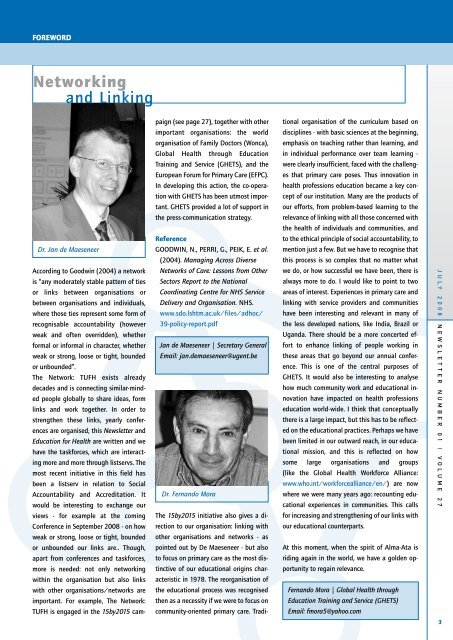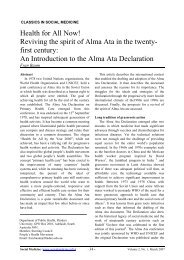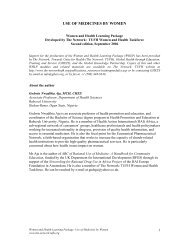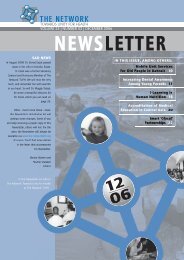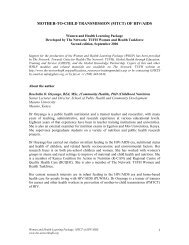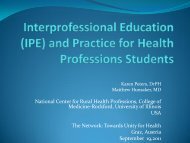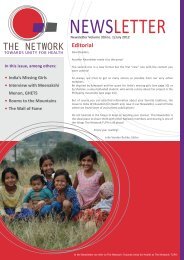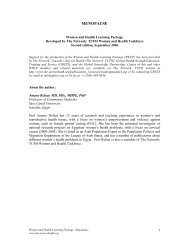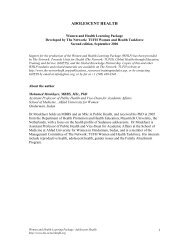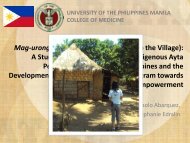Tamas Fülöp Award - The network - Towards Unity For Health
Tamas Fülöp Award - The network - Towards Unity For Health
Tamas Fülöp Award - The network - Towards Unity For Health
You also want an ePaper? Increase the reach of your titles
YUMPU automatically turns print PDFs into web optimized ePapers that Google loves.
FOREWORD<br />
Networking<br />
and Linking<br />
paign (see page 27), together with other<br />
tional organisation of the curriculum based on<br />
important organisations: the world<br />
disciplines - with basic sciences at the beginning,<br />
organisation of Family Doctors (Wonca),<br />
emphasis on teaching rather than learning, and<br />
Global <strong>Health</strong> through Education<br />
in individual performance over team learning -<br />
Training and Service (GHETS), and the<br />
were clearly insufficient, faced with the challeng-<br />
European <strong>For</strong>um for Primary Care (EFPC).<br />
es that primary care poses. Thus innovation in<br />
In developing this action, the co-opera-<br />
health professions education became a key con-<br />
tion with GHETS has been utmost impor-<br />
cept of our institution. Many are the products of<br />
tant. GHETS provided a lot of support in<br />
our efforts, from problem-based learning to the<br />
the press-communication strategy.<br />
relevance of linking with all those concerned with<br />
the health of individuals and communities, and<br />
Reference<br />
to the ethical principle of social accountability, to<br />
Dr. Jan de Maeseneer<br />
GOODWIN, N., PERRI, G., PEIK, E. et al.<br />
mention just a few. But we have to recognise that<br />
(2004). Managing Across Diverse<br />
this process is so complex that no matter what<br />
According to Goodwin (2004) a <strong>network</strong><br />
is “any moderately stable pattern of ties<br />
or links between organisations or<br />
between organisations and individuals,<br />
where those ties represent some form of<br />
recognisable accountability (however<br />
weak and often overridden), whether<br />
formal or informal in character, whether<br />
weak or strong, loose or tight, bounded<br />
or unbounded”.<br />
<strong>The</strong> Network: TUFH exists already<br />
decades and is connecting similar-minded<br />
people globally to share ideas, form<br />
links and work together. In order to<br />
strengthen these links, yearly conferences<br />
are organised, this Newsletter and<br />
Education for <strong>Health</strong> are written and we<br />
have the taskforces, which are interacting<br />
more and more through listservs. <strong>The</strong><br />
most recent initiative in this field has<br />
been a listserv in relation to Social<br />
Accountability and Accreditation. It<br />
would be interesting to exchange our<br />
Networks of Care: Lessons from Other<br />
Sectors Report to the National<br />
Coordinating Centre for NHS Service<br />
Delivery and Organisation. NHS.<br />
www.sdo.lshtm.ac.uk/files/adhoc/<br />
39-policy-report.pdf<br />
Jan de Maeseneer | Secretary General<br />
Email: jan.demaeseneer@ugent.be<br />
Dr. Fernando Mora<br />
we do, or how successful we have been, there is<br />
always more to do. I would like to point to two<br />
areas of interest. Experiences in primary care and<br />
linking with service providers and communities<br />
have been interesting and relevant in many of<br />
the less developed nations, like India, Brazil or<br />
Uganda. <strong>The</strong>re should be a more concerted effort<br />
to enhance linking of people working in<br />
these areas that go beyond our annual conference.<br />
This is one of the central purposes of<br />
GHETS. It would also be interesting to analyse<br />
how much community work and educational innovation<br />
have impacted on health professions<br />
education world-wide. I think that conceptually<br />
there is a large impact, but this has to be reflected<br />
on the educational practices. Perhaps we have<br />
been limited in our outward reach, in our educational<br />
mission, and this is reflected on how<br />
some large organisations and groups<br />
(like the Global <strong>Health</strong> Workforce Alliance:<br />
www.who.int/workforcealliance/en/) are now<br />
where we were many years ago: recounting educational<br />
experiences in communities. This calls<br />
J U L Y 2 0 0 8 N E W S L E T T E R N U M B E R 0 1 | V O L U M E 2 7<br />
views - for example at the coming<br />
<strong>The</strong> 15by2015 initiative also gives a di-<br />
for increasing and strengthening of our links with<br />
Conference in September 2008 - on how<br />
rection to our organisation: linking with<br />
our educational counterparts.<br />
weak or strong, loose or tight, bounded<br />
other organisations and <strong>network</strong>s - as<br />
or unbounded our links are.. Though,<br />
pointed out by De Maeseneer - but also<br />
At this moment, when the spirit of Alma-Ata is<br />
apart from conferences and taskforces,<br />
to focus on primary care as the most dis-<br />
riding again in the world, we have a golden op-<br />
more is needed: not only <strong>network</strong>ing<br />
tinctive of our educational origins char-<br />
portunity to regain relevance.<br />
within the organisation but also links<br />
acteristic in 1978. <strong>The</strong> reorganisation of<br />
with other organisations/<strong>network</strong>s are<br />
the educational process was recognised<br />
Fernando Mora | Global <strong>Health</strong> through<br />
important. <strong>For</strong> example, <strong>The</strong> Network:<br />
then as a necessity if we were to focus on<br />
Education Training and Service (GHETS)<br />
TUFH is engaged in the 15by2015 cam-<br />
community-oriented primary care. Tradi-<br />
Email: fmora5@yahoo.com<br />
3


